Yousef Bashir | |
|---|---|
| Born | 1989 Gaza Strip |
| Citizenship | United States |
| Alma mater | Northeastern University (B.A.) Brandeis University (M.A.) |
| Relatives | Khalil Bashir (father) |
Yousef Bashir (born 1989) is a Palestinian-American author and peace activist.
Yousef Bashir | |
|---|---|
| Born | 1989 Gaza Strip |
| Citizenship | United States |
| Alma mater | Northeastern University (B.A.) Brandeis University (M.A.) |
| Relatives | Khalil Bashir (father) |
Yousef Bashir (born 1989) is a Palestinian-American author and peace activist.
Bashir was born in and grew up in the Gaza Strip. [1] [2] His father, Khalil Bashir, was the headmaster of the German school in Gaza. [3] Bashir's parents stressed nonviolence as a form of resistance, [4] and told him that hatred would not lead to peace. [1]
His family's home was occupied by Israeli soldiers in 2000, during the Second Intifada, due to its proximity to the religious settlement of Kfar Darom. [1] [5] Although given the opportunity to leave, the Bashir family was determined to stay, knowing they likely would not be able to return to their property if they left. [5] The soldiers destroyed the family's greenhouses and orchards and forced his family (Bashir, his parents, grandmother, and seven siblings) [3] to sleep in the living room, while the soldiers used the second and third floors of the house. [1] [2] [5] That year, Bashir's brother, Yazen, was shot non-fatally by soldiers while putting out a fire in the family's garden. [3] [5]
Bashir was shot by an Israeli soldier on February 18, 2004, at age 15, resulting in a spinal injury. [1] [2] The shooting occurred at Bashir's home, while the family was saying goodbye to UN staffers who were visiting. [3] [5] Although the Israeli army took responsibility for the shooting, they did not provide an explanation as to why it happened. [5] He was brought to a hospital in a UN car. [6] [7] Because the local hospital did not have the resources to treat him, [2] Bashir was brought to a hospital in Tel HaShomer, Israel, where he formed connections with some of the Israeli healthcare workers who treated him. [1] After four months in the hospital, he was transferred to Shikum Yiladem, a rehabilitation center where he lived and attended physical therapy with 12 Israeli children, whom he also made connections with over the sixteen months he spent there. [2] [8] By the end of his stay, Bashir was able to walk again, and he returned to his family home in Gaza. [1]
In 2005, Bashir attended an American summer camp in Maine run by Seeds of Peace. [5] [8] The experience made Bashir decide he wanted to pursue his education in the United States. [8] His family regained full control of their home in September 2005. [5]
Following rehabilitation for his injury, Bashir chose to attend a Quaker high school in Ramallah. [8] However, he remained interested in studying in the United States, and in 2006, at age 16, he moved to the US, where he attended school at Wasatch Academy in Utah. [2] [4] [8]
Bashir earned his undergraduate degree in international studies at Northeastern University in Boston, although he had originally hoped to attend Brandeis University. [8] [7] He was able to attend Brandeis for graduate school, where he received a master’s degree in Conflict and Coexistence. [6] [8]
In August 2024, Bashir finished a Ph.D. in international affairs at Johns Hopkins University. [1]
In 2009, Bashir's father died. Bashir was inspired to write a memoir based on his childhood experiences and his father's teachings on nonviolence. [4] In 2018, Bashir published a memoir, The Words of My Father: Love and Pain in Palestine, in the United Kingdom. [3] In 2018, the Times Literary Supplement included the memoir on its Books of the Year list. [3] In a review for the Jewish Book Council, Ada Brunstein of the MIT Press noted the omission of any "exploration of the role or methods of Palestinian leadership." [9]
In 2014, Bashir expressed interest in becoming a diplomat and returning to Gaza in that role. [6] In 2017, Bashir interned on Capitol Hill for Representative Gerald Connolly. [7] [8] At the time, he expressed interest in working on Capitol Hill full-time as a foreign affairs advisor. [7] He was later hired as an intern for Senator Bernie Sanders. [10]
Bashir has written for The Forward [4] and The New York Times , [11] and has spoken with MSNBC. [12] He has lobbied for Palestinian interests and spoken to pro-Israel organizations, including AIPAC, and to Jewish audiences about his personal experiences and to make the case for peace. [10] [13]
As of 2022, Bashir was Director of Research & Operations for the S. Daniel Abraham Center for Middle East Peace. [14]
Bashir became a U.S. citizen in 2019, after applying in 2017. [4] [8] As of 2017, Bashir had not visited Gaza since he left in 2006, out of fear that he would be unable to leave again. [8] Bashir lives in Washington, D.C. [1]
This page is a partial listing of incidents of violence in the Israeli-Palestinian conflict in 2000.

The First Intifada, also known as the First Palestinian Intifada, was a sustained series of non-violent protests, acts of civil disobedience and riots carried out by Palestinians in the Israeli-occupied Palestinian territories and Israel. It was motivated by collective Palestinian frustration over Israel's military occupation of the West Bank and the Gaza Strip as it approached a twenty-year mark, having begun in the wake of the 1967 Arab–Israeli War. The uprising lasted from December 1987 until the Madrid Conference of 1991, though some date its conclusion to 1993, the year the Oslo Accords were signed.
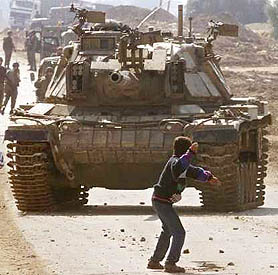
The Second Intifada, also known as the Al-Aqsa Intifada, was a major uprising by Palestinians against Israel and its occupation from 2000. The period of heightened violence in the Palestinian territories and Israel continued until the Sharm el-Sheikh Summit of 2005, which ended hostilities.
The International Solidarity Movement is a Palestinian-led movement focused on assisting the Palestinian cause in the Israeli–Palestinian conflict. ISM is dedicated to the use of nonviolent protests and methods only. The organization calls on civilians from around the world to participate in acts of nonviolent protests against the Israeli military in the West Bank and the Gaza Strip. The ISM participates in the Free Gaza Movement.

On 30 September 2000, the second day of the Second Intifada, 12-year-old Muhammad al-Durrah was killed at the Netzarim Junction in the Gaza Strip during widespread protests and riots across the Palestinian territories against Israeli military occupation. Jamal al-Durrah and his son Muhammad were filmed by Talal Abu Rahma, a Palestinian television cameraman freelancing for France 2, as they were caught in crossfire between the Israeli military and Palestinian security forces. Footage shows them crouching behind a concrete cylinder, the boy crying and the father waving, then a burst of gunfire and dust. Muhammad is shown slumping as he is mortally wounded by gunfire, dying soon after.

Palestinian political violence refers to acts of violence or terrorism committed by Palestinians with the intent to accomplish political goals, and often carried out in the context of the Israeli–Palestinian conflict. Common objectives of political violence by Palestinian groups include self-determination in and sovereignty over all of the region of Palestine, or the recognition of a Palestinian state inside the 1967 borders. This includes the objective of ending the Israeli occupation. More limited goals include the release of Palestinian prisoners held by Israel and recognition of the Palestinian right of return.

The 2000 Ramallah lynching was an attack that took place early during the Second Intifada on 12 October 2000 in the Israeli-occupied West Bank, when a Palestinian crowd of passing funeral marchers broke in and killed two Israeli military reservists and then mutilated their bodies.

Palestine: Peace Not Apartheid is a book written by 39th President of the United States Jimmy Carter. It was published by Simon & Schuster in November 2006.
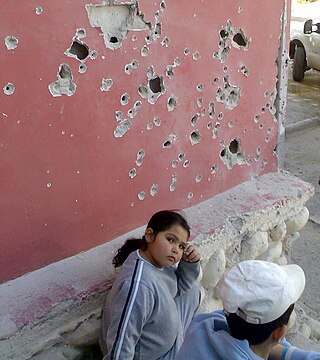
Children and children's rights have long been a focal point of the ongoing Israeli–Palestinian conflict, dating as early as the 1929 Hebron massacre and the 1948 Deir Yassin massacre, both of which claimed the lives of children, precipitating a long conflict that has often led to the displacement, injury, and death of youths. Youth exposure to hostilities increased notably during the First and Second Intifada, where harsh responses from Israeli forces towards Palestinian adolescents and children protesting the Israeli occupation led to the arrest and detention of many Palestinian youth, in addition to other human rights abuses.
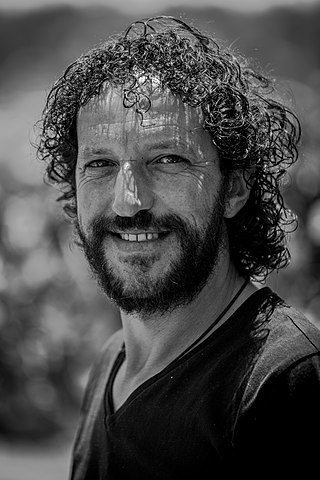
Ali Abu Awwad is a prominent Palestinian peace activist and proponent of nonviolence. He is the founder of Taghyeer (Change), a Palestinian national movement promoting nonviolence to achieve and guarantee a nonviolent solution to the conflict. Awwad's story and efforts have been featured in over twelve documentaries including two award-winning films, Encounter Point and Forbidden Childhood. Furthermore, he was honored by the global nonprofit thinktank Synergos as the Arab World Social Innovator in Palestine for "introducing non-violence, reconciliation, and civic participation to Palestinians as a means of empowering citizens to seek social change and find a more equitable solution to conflict." Awwad is currently finishing his memoir called Painful Hope, an account of his experiences as well as his strategy and vision for the Palestinian future. He lives in Beit Ummar, near Hebron.

Mustafa Barghouti is a Palestinian physician, activist, and politician who serves as General Secretary of the Palestinian National Initiative (PNI), also known as al-Mubadara. He has been a member of the Palestinian Legislative Council since 2006 and is also a member of the Palestine Liberation Organization (PLO) Central Council. In 2007, Barghouti was Minister of Information in the Palestinian unity government. He is an advocate of the use of non-violence and civil disobedience to confront Israel's illegal occupation of the West Bank, Gaza Strip, and East Jerusalem.

Ali Hasan Abunimah is a Palestinian-American journalist who has been described as "the leading American proponent of a one-state solution to the Israeli–Palestinian conflict". A resident of Chicago who contributes regularly to publications such as the Chicago Tribune and the Los Angeles Times, he has served as the vice-president on the board of directors of the Arab American Action Network, is a fellow at the Palestine Center, and is the executive director and a co-founder of The Electronic Intifada website. He has appeared on many television discussion programs on CNN, MSNBC, PBS, and other networks, and in a number of documentaries about the Israeli–Palestinian conflict, including Collecting Stories from Exile: Chicago Palestinians Remember 1948 (1999). In 2014, he published The Battle for Justice in Palestine, which won the Palestine Book Award General Prize.
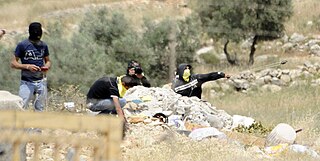
Palestinian stone-throwing refers to a Palestinian practice of throwing stones at people or property. It is a tactic with both a symbolic and military dimension when used against heavily-armed troops. Proponents, sympathizers, as well as some analysts have characterized stone throwing by Palestinians as a form of "limited", "restrained", "non-lethal" violence. Such stone-throwing can at times prove lethal: over a dozen Israelis, including women, children, and infants, have died as a result of stones being thrown at cars. Some Palestinians appear to regard it as symbolic and non-violent, given the disparity in power and equipment between the Israeli forces and the Palestinian stone-throwers. The state of Israel has passed laws to sentence throwers convicted of the charge to up to 10 years imprisonment even without proof of intent to harm. In some cases, Israelis have argued that it should be treated as a form of terrorism, or that, in terms of the psychology of those who hurl stones, even in defense or in protest, it is intrinsically aggressive.

An increase of violence occurred in the Israeli–Palestinian conflict starting in the autumn of 2015 and lasting into the first half of 2016. It was called the "Intifada of the Individuals" by Israeli sources, the Knife Intifada, Stabbing Intifada or Jerusalem Intifada by international sources because of the many stabbings in Jerusalem, or Habba by Palestinian sources. 38 Israelis and 235 Palestinians were killed in the violence. 558 Israelis and thousands of Palestinians were injured.
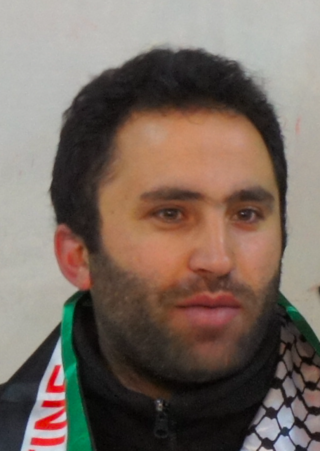
Issa Amro is a Palestinian activist based in Hebron, West Bank. He is the co-founder and former coordinator (2007–2018) of the grassroots group Youth Against Settlements. Amro advocates the use of nonviolent resistance and civil disobedience to fight the Israeli Occupation of the Palestinian Territories. In 2010, he was declared "human rights defender of the year in Palestine" by the Office of the United Nations High Commissioner for Human Rights In 2013, the United Nations Human Rights Council expressed concern for his wellbeing and safety due to numerous accounts of harassment from Israeli soldiers and settlers and a series of arbitrary arrests. At present, Amro is being indicted by the Israeli military court with 18 charges against him. In May 2017, Bernie Sanders along with three U.S. senators and 32 congressmen wrote to Secretary of State Rex Tillerson to urge Israeli authorities to reconsider the charges against Amro.
Chen Alon is an Israeli lecturer, activist, and cofounder of Combatants for Peace. Alon is the Theater Director of the movement. He was nominated, along with Palestinian Combatants for Peace co-founder, Sulaiman Khatib, for the Nobel Peace Prize in 2017. Alon served for four years as an officer in the Israeli Defense Force, upon his release he served 11 years as an operations officer in the reserves. Later he became a "refusenik," and co-founded the group "Courage to Refuse," a group of former IDF officers and combat soldiers refusing to serve in the occupied territories. As a result, he served time in jail. Alon currently works as Theater Director and lecturer at Tel Aviv University.
Ahmed Fouad Alkhatib is a Palestinian American humanitarian activist and blogger. He is the founder and executive director of Project Unified Assistance, a nonprofit organization working towards the establishment of a humanitarian airport in the Gaza Strip, to be run and operated by the United Nations.
Khalil Bashir was a Palestinian peace activist from the Gaza Strip. He gained the attention of news outlets in the early 2000s, when Israeli soldiers occupied his home in Deir al-Balah and strictly controlled his family's movements.

Ramzy Baroud is an American-Palestinian journalist and writer. He is the author of several books on the Israel-Palestinian conflict.
Avi Dabush is an Israeli rabbi, peace activist, and politician. He is the executive director of Rabbis for Human Rights.